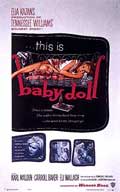
Directed by
Elia Kazan
114 minutes
Rated PG
Reviewed by
Bernard Hemingway


Baby Doll
With a Tennessee Williams script, a re-worked version of his 1941 two one-act plays, '27 Wagonloads of Cotton' and 'The Long Stay Cut Short', evocative black and white photography by Boris Kaufman who also lensed Kazan's On The Waterfront (1954) and the cast of Carroll Baker, Eli Wallach and Karl Malden, Baby Doll is a fine example of 1950s American social realist cinema. Didactic, reiterative shots and theatrical mise-en-scène contrast with authentic local Mississippi yokels in the minor roles to great effect in what is a typical Williams story of sexual repression and moral and physical corruption in the Deep South.
Malden plays Archie Lee Meighan the owner of a broken-down cotton gin who has as a wife the 19-year-old Baby Doll (Baker), whose father he promised not to touch until she turned twenty, which when the film opens is only two days away. He’s virtually mad with anticipation but he gets even madder when a cunning rival (Eli Wallach in his screen debut) starts making overtures to Baby Doll.
Malden and Wallach are each in their way too mild for their roles but Baker in her first major role and then aged 25 is perfect as the title character There is an excellent version of "Baby Please Don't Go" on the soundtrack and a memorable line from a lascivious Wallach to Baker: "Why don't you come up and sing me to sleep".
FYI: The film received a total of four Academy Award nominations: Best Actress for Baker, Best Adapted Screenplay for Williams, Best Cinematography and Best Supporting Actress (for Mildred Dunnock) but, unsurprisingly, won none.
The film was the target of the Legion of Decency's first-ever nationwide boycott of an American-made film produced by a major studio.whilst Time Magazine called it the dirtiest American-made motion picture that had ever been legally exhibited. It was cancelled by 75% of theaters scheduled to show it, and it made only $600,000 at the box office. Needless to say, times have changed.
Want something different?





